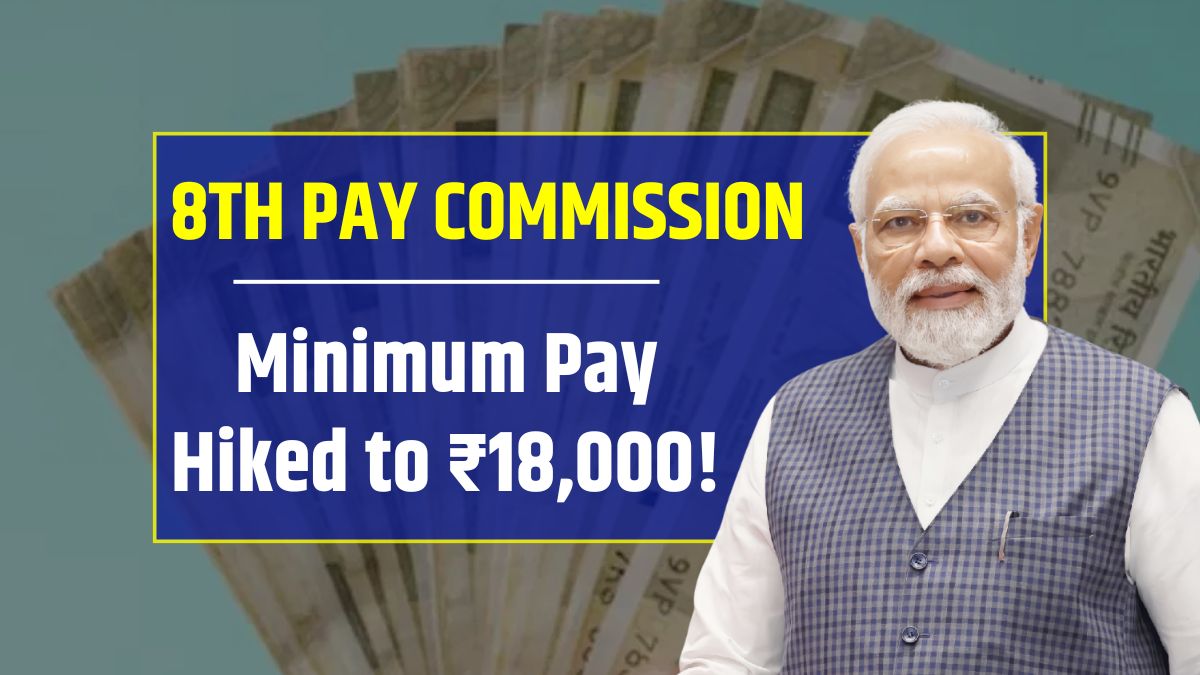8th Pay Commission Latest Update – The 8th Pay Commission is set to bring significant changes to the salaries and pensions of central government employees in India. With rising inflation and increasing living costs, this revision aims to ensure better financial stability for millions of public sector workers and pensioners.
Understanding the Fitment Factor and Salary Hike
One of the most crucial aspects of salary revision is the fitment factor. This multiplier is applied to the basic salary to determine the new pay scale. Under the 7th Pay Commission, the fitment factor was set at 2.57, which raised the minimum basic salary from 7,000 to 18,000. However, discussions around the 8th Pay Commission suggest that the fitment factor might range between 1.92 and 2.08. While this indicates a possible salary hike of 10% to 30%, many employees were initially expecting a more significant boost with a fitment factor of 2.86.
Former Finance Secretary Subhash Chandra Garg has suggested that a fitment factor in this realistic range would be financially viable for the government while still offering meaningful salary increases. Although some employees had hoped for a more generous increase, the proposed adjustments still mark a positive step forward.
Expected Salary Increments Across Pay Levels
If the expected fitment factor of 2.86 is applied, here is how salaries could change across various pay levels:
- Level 1: Current basic pay of 18,000 could increase to 51,480, reflecting an increment of 33,480.
- Level 2: Current basic pay of 19,900 may rise to 56,914, with a boost of 37,014.
- Level 3: Current basic pay of 21,700 could go up to 62,062, increasing by 40,362.
- Level 4: Current basic pay of 25,500 might be revised to 72,930, giving an increment of 47,430.
- Level 5: Current basic pay of 29,200 could increase to 83,512, a jump of 54,312.
- Level 6: Current basic pay of 35,400 may rise to 1,01,244, with an increment of 65,844.
- Level 7: Current basic pay of 44,900 could be revised to 1,28,414, reflecting an increase of 83,514.
These estimated increases show that the government is taking substantial steps to enhance employee earnings, ensuring that central government staff receive a fair wage that aligns with modern economic conditions.
Impact on Allowances and Pensions
The salary revisions will also impact various allowances and pension benefits, which are directly linked to the basic pay. Here are some of the key benefits employees can expect:
- Dearness Allowance (DA): Since DA is calculated as a percentage of basic pay, the increase in salaries will naturally lead to higher DA payouts, providing additional financial relief against inflation.
- House Rent Allowance (HRA): With a rise in basic pay, HRA will also increase. Employees residing in different city categories (metro, urban, or rural) will benefit from an adjusted HRA to support housing expenses.
- Pension Revisions: Retired employees will see their pensions rise in proportion to their last drawn basic pay, ensuring they receive fair post-retirement financial support. This increase will help pensioners maintain their standard of living and manage healthcare and other expenses more comfortably.
Implementation Timeline
The 8th Pay Commission is expected to be implemented by 2026. Traditionally, pay commissions in India are introduced every ten years, allowing sufficient time for administrative changes and financial planning. This schedule ensures that the transition is smooth, preventing delays and complications for government employees and pensioners.
While the final approval and exact salary figures are yet to be confirmed, the expected revisions are a welcome relief for many. The upcoming pay hikes and revised allowances demonstrate the government’s commitment to ensuring fair wages and a sustainable financial structure for public sector workers.
The introduction of the 8th Pay Commission is a significant development for central government employees and pensioners. The potential salary hikes and revised allowances aim to address rising living costs and ensure fair compensation. While discussions continue about the fitment factor and other salary-related components, one thing is clear – the 8th Pay Commission will bring a positive financial transformation for millions of government workers across India.
Employees and pensioners should stay updated with official announcements to understand how these changes will impact their salaries and benefits. The coming years will see essential adjustments that will reshape financial planning and living standards for many, ensuring a better future for government employees and their families.



